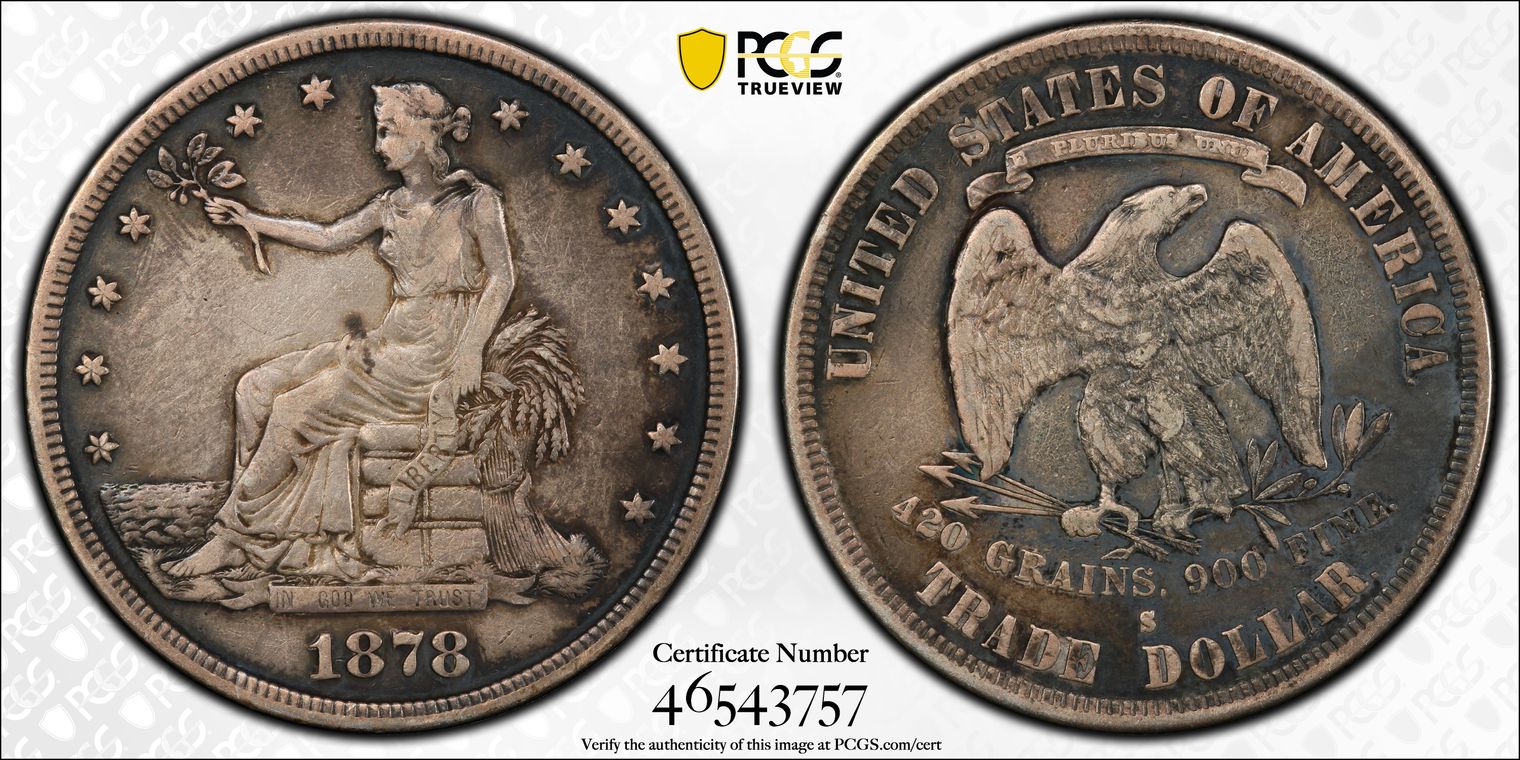1878-S T$1 Trade N1 认证号46543757, PCGS号7048
专家评论
Q. David Bowers
The following narrative, with minor editing, is from my "Silver Dollars & Trade Dollars of the United States: A Complete Encyclopedia" (Wolfeboro, NH: Bowers and Merena Galleries, Inc., 1993):Coinage Context
Production halt delayed: By February 22, 1878, when Secretary of the Treasury John Sherman halted trade dollar mintage, the San Francisco Mint had already made 1,695,819 pieces. This branch did not end production until early April; by then the total was 4,162,000, nearly a record production (the fourth highest in the series).
By the time that the last 1878-S trade dollar fell from the dies, coins of this denomination valued at over $36 million had been produced, a staggering sum, and an amount over four times greater than all of the silver dollars that had been coined from 1794 until the denomination was suspended in 1873.
In a way it is curious that the trade dollar denomination was suspended at the very height of its success, but such was (and is) politics. The Bland-Allison Act offered greater opportunities for the silver market than did the trade dollar legislation; now, with the Bland-Allison Act and the Morgan dollar, the government was forced to buy silver and make silver dollars. It was never forced to make trade dollars.
Quantities melted: It is believed that quantities of this issue were melted at the San Francisco Mint, but no records have been seen. Quantities of 1878-S trade dollars remained in commercial channels in the Orient through the 1950s.
Numismatic Information
Circulated grades: In circulated grades from VF-20 to AU-58 there are probably 30,000 or more coins in existence. In terms of ease of availability it is second only to 1877-S. Chopmarked coins are plentiful and are the second most common issue (after 1877-S).
The 1877-S and 1878-S have been favorites for inclusion in type sets because of their availability.
Mint State grades: In Mint State the 1878-S is one of the most available of all trade dollar issues. My population estimates are as follows: MS-65: 70 to 140 or more; MS-64: 175 to 350 or more; MS-63: 200 to 400 or more; and MS-60 to 62: 1,000 to 2,000 or more.
Varieties:
OBVERSE TYPE II, RIBBON ENDS POINT DOWN, 1876-1885
REVERSE TYPE II: NO BERRY BELOW CLAW, 1875-1885
Business strikes:
1.Large (also called "medium") filled S: Breen-5819. Mintmark 1.17 mm high. Mintmark filled (so that it appears as a blob). Do any of these have the broken R and/or missing periods of 1877-S dies? Common.
2. 1878-S Large clear S: Breen-5820. Mintmark 1.2 mm high. Common. Do any of these have the broken R and/ or missing periods of 1877-S dies? At least one variety has the right extension of the cross-bar missing in 4 in 420 (on some impressions the extension is weak and barely visible). One variety has an extra point to obverse star 10.
3. 1878-S Doubled reverse die: Breen-5821. Fivaz & Stanton $1015. Rare. Doubling plainest at 420 GRAINS, UNITED, and arrow tips. Large S mintmark. illustrated in Numismatic News February 16, 1988, p. 6, Coin World November 29, 1989, p. 106. Rare. The several seen by the author have been in VF grade.
Enabling legislation: Act of February 12, 1873
Designer: William Barber
Weight: 420 grains
Composition: .900 silver, .100 copper
Melt-down (silver value) in year minted: $0.9070
Dies prepared: Obverse: Unknown; Reverse: Unknown. (On December 29, 1880,36 reverse dies were returned to the Philadelphia Mint.) Business strike mintage: 4,162,000. Delivery figures by month: January: 1,335,000; February: 1,484,000; March: 1,308,000; April: 35,000.
Characteristics of striking: Usually seen well struck. However, among large mintage issues such as this there are many variations in striking quality.
Known hoards of Mint State coins: A small hoard of about 15 pieces surfaced in Washington State in 1989; some of these were later sold in the 1990 ANA Convention auction sale.(Per letter from Douglas Winter to the author, March 31, 1992. Also mentioned by Bruce Amspacher in John Highfill's Encyclopedia.)
Rarity with original Chinese chopmark(s): 1878-S. Extremely plentiful. Second most common (after 1877-S) of all chopmarked trade dollars.
Commentary
The 1878-S is very common in all grades.
PCGS #
7048
设计师
William Barber
边缘
Reeded
直径
38.10 毫米
重量
27.20 克
铸币数量
4162000
金属成分
90% Silver, 10% Copper
更高评级数量
2447
评级较低的钱币数量
0
地区
The United States of America
价格指南
PCGS 数量报告
拍卖 - PCGS 评级的
拍卖 - NGC 评级的
稀有性和存量估计 了解更多
| 所有评级 | 4000 |
| 60或以上 | 750 |
| 65或以上 | 50 |
| 所有评级 | R-4.2 |
| 60或以上 | R-5.5 |
| 65或以上 | R-8.5 |
| 所有评级 | 16 / 18 |
| 60或以上 | 15 / 18 |
| 65或以上 | 18 / 18 |
| 所有评级 | 16 / 18 |
| 60或以上 | 15 / 18 |
| 65或以上 | 18 / 18 |























